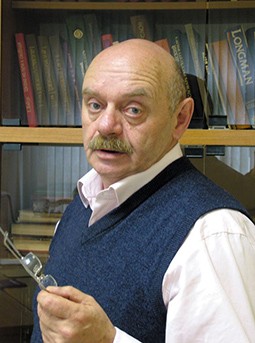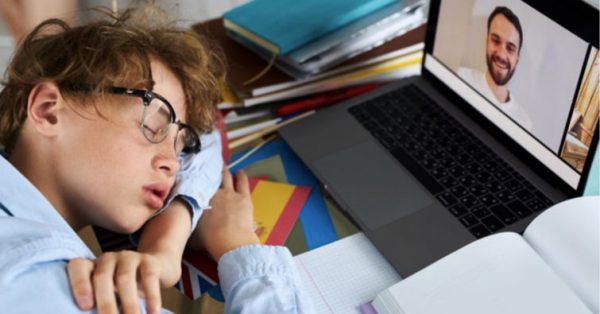 Children have a lot of homework, they receive grades the same way as before, but schooling in distance learning format has become completely different. Children sit before the computer for 45 minutes of the lesson, they eat more due to stress, and they are simply tired. Tired of uncertainty, school load, and four walls. How can this be changed? Efim Rachevskiy, the head of the school №548, a people’s teacher of Russia, talks about the problems and discoveries of distance learning.
Children have a lot of homework, they receive grades the same way as before, but schooling in distance learning format has become completely different. Children sit before the computer for 45 minutes of the lesson, they eat more due to stress, and they are simply tired. Tired of uncertainty, school load, and four walls. How can this be changed? Efim Rachevskiy, the head of the school №548, a people’s teacher of Russia, talks about the problems and discoveries of distance learning.
Learning on the Internet is like love by correspondence

Efim Rachevskiy
The abrupt transition to distance learning in the spring was absolutely unexpected, so the transfer of didactics from the classroom to the virtual space (which is absurd, in principle) was the number one problem. Most of the teachers did not know how to work online. However, since teachers at the school №548 have been teaching Russian-speaking children from other countries since 2005, we have had this experience.
The second problem was the huge variety of tools. If it were a person-centered education, then every child and teacher could interact how and where they wish so: be it ZOOM, Google, Microsoft Teams, and so on. But since we teach in groups, it is more comfortable to use a common platform.
By trial and error, we decided on a single Microsoft Teams platform by April. It is free for the school and teachers, quite capacious, it has good features, and Microsoft immediately responds to requests for adjustments of certain settings. As a result, we continue using this platform now.
Education on the Internet was unusual for us. It is like love by correspondence, but we slowly adapted to it.
At the end of spring, there was an illusion that everything would end in the summer. In summer, people asked whether we would go back to school in September or not.
On September 1, everyone came to school looking beautiful, smelling good, everyone was lively and warm. Then bang! – October came along with the second wave. You know how it goes: it seems that the disease has passed, and relapse suddenly happens.
What is wrong with the talking head on the screen?
In fall, all sorts of euphoria of expectation, event-based decisions, and information invisibility disappeared: online communication became routine. In the first wave of the pandemic, we learned how to hold a shovel in our hands, and when the second wave started, we began to think about what to do with this shovel. Therefore, new problems arose at the second stage of distance learning.
The first one is about how to get rid of the talking head on the child’s screen. The teacher’s talking head is a pathetic attempt to transfer classical didactics to a new space and technology. Sanitary Rules and Norms determine how long a child can be near a computer.
When there is a talking head on the screen for the whole lesson, the child is forced to look at it for 45 minutes whether they like it or not.
So we started changing the design of a lesson. The talking head can be completely removed, there are document cameras, which can directly show the online whiteboard or an ordinary textbook, and a teacher can sit and work as usual, and the others will watch you work.
By the way, infographics have a lot of benefits, as children’s perception is highly visualized, and there are a great many tools for this.
Furthermore, you can use mixed learning techniques or the so-called “inverted class”. This is when the teacher divides students into three groups of ten people and gives them diversified tasks. The first ten students interact with the teacher for 10-12 minutes, the second group works on tasks, and the third one independently learns new information after receiving recommendations from the teacher which part of the textbook they should open. After this, there are 10 minutes left for everyone to work together and reflect on this new information.
This is one of dozens of ways to reduce the time the child spends at a working computer.
A lot of homework is bad
The second problem is homework. By the way, the “home” part of this word is absurd in this situation as the child is already at home all the time.
Even before the pandemic, I said that it was pointless, because nowadays children can do their homework using their devices wherever they want: in the park, in subway, and so on. I have long been trying to introduce a new formula: independent work instead of homework.
The amount of homework has increased, because teachers have the illusion that if the child does not learn something now, does not look at it, then their life would not work out as it is supposed to, and they need to urgently load the child to the maximum, because it will help them understand. Yet, we are slowly getting rid of this illusion.
How should teachers grade children at distance learning?
Another problem is assessment, which is a very important point. We have changed the local, small-scale assessment of academic achievements, made it more flexible, and grades have become voluntary for some classes.
The classical grade system acts on the presumption of the child’s guilt, so the child is graded not for their good work, but for their disadvantage: an A if the child did very well, a B if the child performed the tasks a little bit worse, a C if the child did even worse, and so on.
We tried to get rid of this and make assessment for a number of subjects voluntary: if I want this grade, I solve 12 problems in geometry, if I agree to a lower grade, I solve 8 problems. If I do not want the grade, I say, “Oh, screw grades, I would rather go eat and will not do anything, let them give me an F”. Voluntary assessment is important psychologically.
Today, there is not a single regulatory act at the state level that would regulate how students should be graded.
The teacher of literature has the right to give a grade for the child reading or even singing one poem. Accordingly, there can be all kinds of assessment: an interview, a test etc.
State assessment is another matter. It includes the final essay, the Unified State Exam, the Basic State Exam (all-Russian tests are not a part of the state assessment, this is a diagnostic assessment). We cannot change anything here. Therefore, we do not change anything for grades that fall under the state final assessment: 9th and 11th grades, but problems are solved there as well.
However, everything else is within the school’s jurisdiction according to the law on education, so the school can even relinquish the five-point grading system and replace it with a hundred-point grading system, introduce a qualitative assessment as in the 19th century: “good”, “very bad”, “dreadful”, “excellent” etc.
There are many children, but only one computer
The next important point that has become quite critical is the interaction with modern learning tools. This is not only the whiteboard or the Moscow electronic knowledge database, but there are others like online boards, work with editor tools. How can one draw lines so that they are straight on this board?
I recently held a large teachers’ meeting with 300 people, and teachers shared their best practices there, told who did it and how they did it, and others picked it up. Naturally, everyone has different competencies and skills in working with these tools, but no one is greedy, and everyone shares useful knowledge with each other.
Another important aspect is the technical organization of the educational process that considers the capabilities of a family. There are difficulties in those families where parents work from home and children study at home as well: what can they do if mom, dad, and three children need a computer at the same time?
We quickly compiled a list of such families, prepared a contract, and gave them laptops from school resources, so we solved this issue. There are no problems with Internet in the Moscow area: both in the city and in the region.
“Help! Children started gaining weight”
Some parents wrote to me about the following interesting issue in an email: “Do something, because children started gaining weight”.
It is clear why that happens: we talk about teenagers from 6th to 11th grade who are at home all day, the refrigerator is nearby, and we all know that food is a very powerful preventive mechanism from depression.
We have involved our sports group and are trying to do something with the help of our teachers.
However, after seeing how teachers do push-ups and splits at school in front of the camera, parents started to protest: poor children sit at home without moving and your teachers are doing splits in the gym that is for children. I replied that I was ready to stop all this, then the children would sit by the fridge and wait for the signal that they can eat borsch. It seems like that put the matter to rest.
Is the child tired? Let them skip 2-3 days of school
Of course, one of the main problems is weariness from such learning, from uncertainty, from everything.
Weariness can be overcome by changing activities. The child needs to communicate with friends, do their own things, read, or draw.
I simply recommend parents of children who are tired to let the school know through one of the channels: WhatsApp, blog, VK, or somewhere else, “My son Fedya is tired, therefore we are taking a time-out for three days”. That is it. During these three days, they do not allow Fedya to access the computer, turn off the Internet and power at home, buy candles, and cook something delicious together, preferably something that can be made in the oven. Fedya walks, goes skiing somewhere, goes to the country house…
There is nothing terrible about it. In fact, this could have been done before COVID-19 situation, but few people used this opportunity, because parents have the illusion that if the child does not go to school, as it is the main place for children’s education in their perception, then they will only get a janitor’s position in the future.
Yet, if the child skips 2-3 days, nothing terrible will happen. Why is it so that if a child has ARVI, they can skip classes, but if they are tired, they cannot? After all, weariness is also a destructive factor, no less destructive than angina.
Distance learning is a necessary measure, teachers get sick
As a rule, conspiracy theories tend to appear like foam on a wave during crises. Remember, we had Kashpirovskiy who hypnotized entire halls in the late 90s and Chumak who charmed water, we had sorcerers and so on. And now we have the conspiracy of the world government, Foresight-2030.
The social group of elderly women sitting on benches at entrances disappeared, and why did it disappear? Because these elderly women moved to the Internet.
Perhaps, it is because of them that all these theories are on the Internet. Someone is trying to make political capital out of this: as a rule, it is those, who are losing this capital.
For example, the Communist Party of the Russian Federation held a rally against distance learning a few weeks ago. Elections to the State Duma are coming soon; unfortunately, it is easier to gain political electoral resources with participation in such rallies than by doing something good.
Fortunately, most of the population is adequate and assesses the situation objectively.
The real situation is such that distance learning is a necessary measure at the moment. Yes, children in 1st-5th grades study at school, but this is a forced decision, because first of all, if they are left alone at home, this is a high risk as their level of arbitrariness is much lower than that of 7th graders.
Secondly, if they are not left alone at home (there are about half a million of young schoolchildren in Moscow), parents will have to take a vacation or sick leave. It is clear that this decision is related to the economy.
Another important reason why schoolchildren from 6th to 11th grades are on distance learning is that they are more adapted to independent interaction through online technology. And one more thing: younger schoolchildren are less agile than representatives of the other age group. A 1st grader will not go to the city by themselves, because they do it with their parents, and therefore they naturally have less contact with the outside world, respectively, this is a safer group.
And teachers become victims of numerous contacts of children. Here are the statistics of our school: 68 people out of 500 employees have had COVID-19 during the fall or still have it. The number of children is much less: 118 out of 5000. Therefore, the task is to separate physical contacts of children and teachers.
“If I were a minister…”
If I were a minister, I would do a few simple things. I would cancel the Basic State Exam for 9th graders in analogy with the spring period. I would also repeat the solution for 11th graders like this past June, when only those who wanted to go to universities took the exam.
10% of graduates did not take the Unified State Exam in the spring and went to college with their diplomas. This is very good, because middle-level specialists are worth their weight in gold today.
I would cancel the all-Russian tests because many schools and regional leaders perceive these tests as a kind of a module test. And then, paraphrasing Viktor Chernomyrdin, I would act like this: “Please give the people (that is, us, teachers) the right to make decisions, they will try to make things better”.
Do not interfere with people, they will make things better, but at the same time do not remove responsibility from us.
Translated by Julia Frolova

















